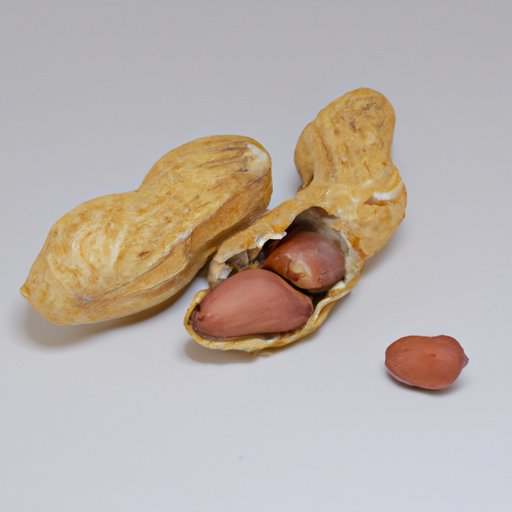Introduction
Peanuts are a type of legume that is often eaten as a snack or used in recipes. They are high in protein, healthy fats, vitamins, minerals, and antioxidants, making them a nutrient-dense food. But, are peanuts bad for you? This article explores the potential health benefits and risks associated with eating peanuts.

Examining the Nutritional Value of Peanuts
Peanuts are an excellent source of macronutrients, vitamins, and minerals. A one-ounce serving (approximately 28 grams) of raw peanuts contains the following nutrients:
- Calories: 166
- Protein: 7 grams
- Fat: 14 grams
- Carbohydrates: 6 grams
- Fiber: 2 grams
In addition to these macronutrients, peanuts also contain several important vitamins and minerals, including:
- Vitamin E: 11% of the daily recommended value
- Manganese: 30% of the daily recommended value
- Magnesium: 20% of the daily recommended value
- Phosphorus: 19% of the daily recommended value
- Niacin: 17% of the daily recommended value
- Folate: 12% of the daily recommended value
- Thiamin: 11% of the daily recommended value
- Vitamin B6: 9% of the daily recommended value
Peanuts are also rich in antioxidants, which are compounds that can help protect cells from damage caused by free radicals. Some of these antioxidant compounds include p-coumaric acid, resveratrol, and phenolic acids.
Exploring Recent Studies on the Health Benefits and Risks of Eating Peanuts
Recent studies have shown that peanuts can provide a variety of health benefits. Here are some of the potential benefits associated with eating peanuts:
Cardiovascular Benefits
One study found that people who ate peanuts at least five times per week had a lower risk of cardiovascular disease than those who did not eat peanuts. The researchers concluded that “the regular consumption of peanuts may contribute to the reduction of cardiovascular disease risk.”
Diabetes Management
Eating peanuts may also help manage diabetes. A study found that people with type 2 diabetes who ate peanuts regularly had better blood sugar control than those who did not eat peanuts. The researchers concluded that “regular peanut consumption may be beneficial for glycemic control in individuals with type 2 diabetes.”
Weight Management
Eating peanuts may also help with weight management. One study found that people who ate peanuts regularly had a lower body mass index (BMI) than those who did not eat peanuts. The researchers concluded that “regular peanut consumption may be associated with lower BMI.”
Cancer Prevention
Eating peanuts may also help reduce the risk of certain cancers. One study found that people who ate peanuts regularly had a lower risk of colorectal cancer than those who did not eat peanuts. The researchers concluded that “regular peanut consumption may be associated with reduced risk of colorectal cancer.”
Allergies
Although peanuts can provide many health benefits, they can also cause allergic reactions in some people. Allergic reactions to peanuts can range from mild to severe and can even be life-threatening. It is important to be aware of the signs and symptoms of a peanut allergy so that it can be properly diagnosed and treated.
Analyzing the Role of Peanuts in a Balanced Diet
Despite their potential health benefits, peanuts should still be consumed in moderation. The American Heart Association recommends limiting your intake of peanuts and other nuts to 1-2 ounces per day. Additionally, it is important to vary your nut intake and incorporate other sources of healthy fats into your diet, such as avocados, olive oil, and fatty fish.

Investigating Allergies Related to Peanuts
If you suspect that you are allergic to peanuts, it is important to see an allergist for a proper diagnosis. Common symptoms of a peanut allergy include hives, swelling, itching, wheezing, shortness of breath, vomiting, and diarrhea. If you experience any of these symptoms, seek medical attention immediately.
Treatment for a peanut allergy typically involves avoiding peanuts and other foods that may contain traces of peanuts. Your doctor may also recommend medications such as antihistamines and epinephrine to treat severe symptoms.

Debunking Common Misconceptions About Peanuts and Health
Many people believe that peanuts are unhealthy because they contain fat and calories. However, peanuts are actually a healthy source of fat and calories when eaten in moderation. Peanuts are low in saturated fat and high in monounsaturated and polyunsaturated fats, which have been linked to improved heart health.
Similarly, some people believe that peanuts are toxic. While peanuts can cause allergies in some people, they are not toxic and are safe to eat in moderation. In fact, peanuts are a nutritious and delicious snack that can provide many health benefits when eaten as part of a balanced diet.
Conclusion
Peanuts are a nutrient-dense food that can provide a variety of health benefits when eaten in moderation. They are an excellent source of protein, healthy fats, vitamins, minerals, and antioxidants. Recent studies have also shown that peanuts may reduce the risk of cardiovascular disease, diabetes, weight gain, and certain types of cancer. However, it is important to be aware of potential allergy concerns and limit your intake of peanuts to 1-2 ounces per day.
In conclusion, peanuts are not bad for you when eaten in moderation as part of a balanced diet. They can provide many health benefits while still being a tasty and nutritious snack.
(Note: Is this article not meeting your expectations? Do you have knowledge or insights to share? Unlock new opportunities and expand your reach by joining our authors team. Click Registration to join us and share your expertise with our readers.)
